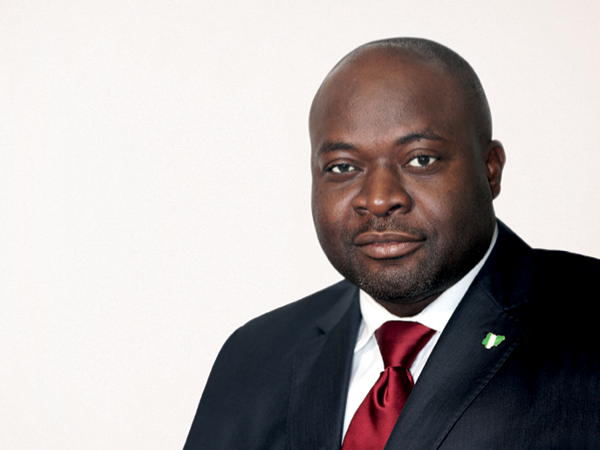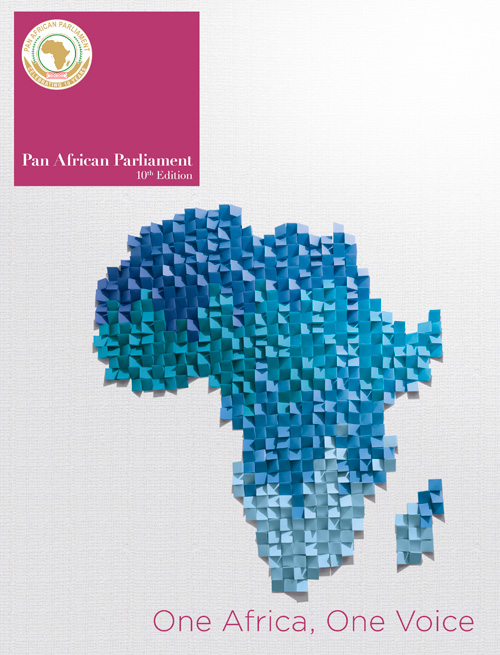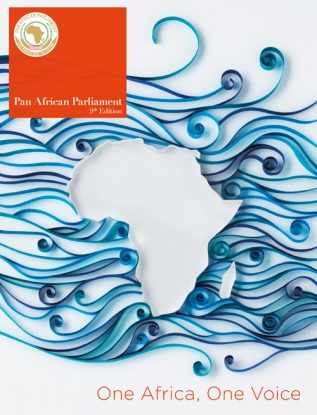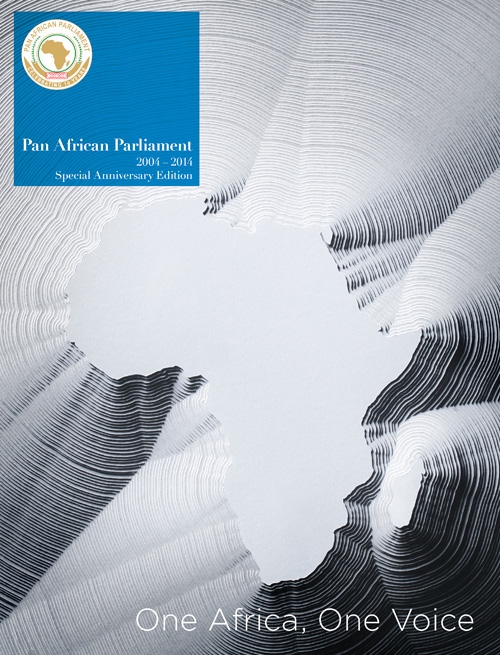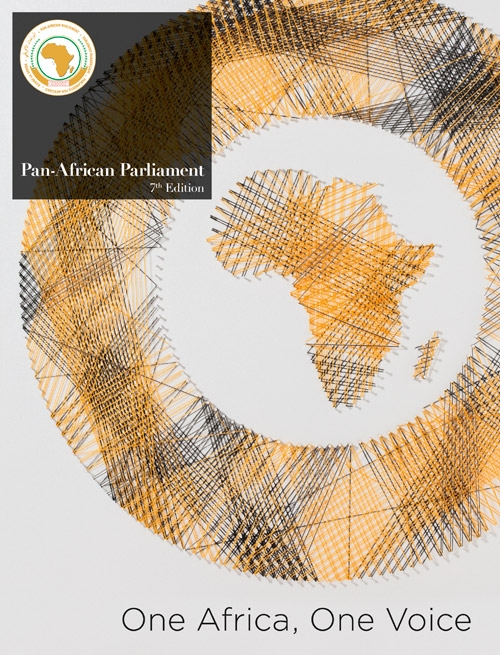
The Protocol establishing the PAP was ratified by 49 Member States and currently the PAP has 205 Members, nominated by National Parliaments. The Pan African Parliamentarians represent all the peoples of Africa and the ultimate aim of the PAP is to evolve into an institution with full legislative powers, whose Members are elected by universal adult suffrage.
The PAP’s recent achievements can be grouped into two categories: political and institutional. From a political point of view, the regular election of public representatives helps to deepen democratic governance and public participation actively. The PAP’s underlying objective is to promote the principles of human rights and democracy in Africa and to encourage good governance, transparency and accountability in Member States. In line with this mandate, the PAP, in collaboration with the AU Commission, deploys Members of the Parliament to Election Observation Missions (EOMs) to various parts of Africa. Recently, Members of the PAP participated in EOM in Angola, Ghana, Senegal, Equatorial Guinea and Kenya. Observing that most conflicts in Africa are now arising from disputes of elections results, the PAP plans to undertake pre- and post-oversight missions to countries of Member States, which are planning to or have undertaken their elections to ensure that peace and security are maintained.
PAP Members played a critical role in the fulfilment of the PAP’s mandate of promoting peace and security in Africa by participating in fact-finding missions in countries with underlying security and human rights challenges. The PAP has interacted with relevant stakeholders on the ground and issued reports, resolutions and recommendations to the Plenary such as in Darfur-Sudan, Central African Republic, Mauritania, Libya, Tunisia, Saharawi, Côte d’Ivoire, Sierra Leone and Liberia. The most recent oversight missions resulted in the presentation of recommendations to resolve the Mali situation and the Sudan-South Sudan border crises to the AU.
The PAP’s underlying objective is to promote the principles of human rights and democracy in Africa and to encourage good governance
The PAP has for a long time advocated for the resolution of the Western Sahara issue and the last session in May 2013 devoted time to understand the humanitarian dimensions of the issue. A special envoy from Western Sahara made a presentation to the Parliament. Many countries are now calling for a speedy resolution of the matter.
In line with its mandate to familiarise the peoples of Africa with the objectives and policies aimed at integrating the African continent within the framework of the establishment of the AU, the PAP organises an annual conference of Speakers of African National Parliaments that features an unprecedented and historical convergence of the pillars of Africa’s legislative institutions.
In 2010, the PAP developed a campaign called 11 by 2011, which ensured that the desired number of ratifications was achieved. The African Charter on Democracy has now been adopted by the AU. In pursuit of the objective to ensure service delivery to the citizens of the African continent, the PAP is organising regional meetings to advocate the ratification of the African Charter on Public Service and the Anti Corruption Charter. The PAP is also promoting the domestication of the African Charter on Democracy as part of the campaign.
The PAP organised a high-level, Africa-wide consultative meeting to chart the post-2015 MDG Agenda. The outcome became known as the African position on the MDG Agenda post 2015. The high-level meeting, which was also supported by the UN, resolved that African solutions for African problems with external support are needed to enable Africa to stand on its feet.
The PAP continues to make progress in many areas such as health and building stronger ties with Regional Parliaments. On the sidelines of the 19th Summit of Heads of State of the AU in Addis Ababa, Ethiopia, the PAP signed a memorandum of understanding with the Joint United Nations Programme on HIV/AIDS (UNAIDS) calling for strategic partnership to advance sustainable responses to HIV as well as address key human rights challenges in Africa.
With regard to the PAP’s institutional achievements, the current Bureau was elected in 2012 and a PAP structure for the staff has been adopted by the AU Assembly in line with the requirements of the Protocol. The PAP established an inter-organ dialogue forum with other organs of the AU to look at the challenges on implementing AU programmes and the integration process as a whole. The AU organs now meet annually.
In the May 2013 session, the chairperson of the AU Commission, HE Nkosazana Dlamini-Zuma addressed the PAP on the new vision of the AU – Vision 2063. This gives the PAP an opportunity to monitor and oversee the implementation of this new vision. In order to strengthen the oversight function of the PAP, the Parliament has aligned its committees with the Departments of the AU.
No organisation, group or nation can afford to sideline half of its membership in core decision making without paying a heavy price
Article 25 requires that five years after entry of the Protocol, a conference of state parties to the Protocol shall be held to review the operation and effectiveness of the Protocol. This Article is read in conjunction with Article 11, which requires the PAP to be vested with legislative powers to be defined by the Assembly. Following the Decision of the Assembly in 2009, requesting the AU Commission to initiate the review process of the Protocol establishing the PAP.
The draft amendment of the Protocol underwent several rigorous validation meetings and workshops, facilitated by the AU Commission and Government legal experts. It was finally approved without reservation by Ministers of Justice and Attorneys General in May 2012. The PRC in July approved the draft. The Executive Council also approved the draft, but with some reservations.
At the 20th Ordinary Session in January 2013, the Assembly of the Union took note of the recommendation of the Executive Council on the Protocol and decided that more in-depth consultation should be undertaken on the draft Protocol. The Assembly decided to defer consideration of the draft Protocol to the Ordinary Session in January 2014.
The AU adopted decisions and policies of a transnational nature, which affect Member States. The PAP therefore requires the legislative powers to develop transnational accountability and oversight frameworks to ensure effective implementation of AU policies.
The main components of the review process relate to the membership of the PAP, the gender composition of the Parliamentary delegations, the election of the MPs into the PAP, electoral rules and procedures to be adopted by Member Parliaments, the tenure of membership and the legislative powers to be accorded to the PAP in defined domains.
If approved, the PAP shall be the legislative organ of the AU and shall exercise legislative functions to be defined by the Assembly. The Assembly shall have the power to determine the subjects/areas on which the PAP may propose draft model laws. The PAP shall also have oversight powers to receive and consider annual budgets and reports on activities of the organs of the AU.
The PAP has launched several advocacy missions aimed at reassuring Member States that may be concerned about their national sovereignty, that a transformed PAP will coexist with National and Regional Parliaments in a manner that will not derogate from or erode their powers or national sovereignty.
There is an urgent need to strengthen democratic institutions to achieve a measure of independence in decision making
A matter the PAP takes very seriously is that of including the female voice. No organisation, group or nation can afford to sideline half of its membership in core decision making without paying a heavy price. Africa faces serious challenges, it is therefore important that we do not exclude the incredible potential of Africa’s women.
For women to be more involved in core decision-making processes, political parties must ensure that women are represented in all decision-making bodies to assure their selection for elections. Women should participate in local government structures as these provide a training ground for national decision-making positions. Women must also be socialised to vote for other women because in any election, they form the majority of voters.
The PAP on its part has been very instrumental in promoting gender equality and affirmative action for women across Africa. Through our annual Women’s Conference, we have highlighted issues on gender and have worked to promote equality and redress imbalances. The proposed amended Protocol of the PAP also requires that the five person National delegations shall be composed of two or three persons of either gender.
The PAP contributes effectively towards democracy in Africa by undertaking its mandate. Africa’s long historical experience of institutional instability deeply underscores the need for the PAP to work towards the consolidation of democratic institutions, democratic culture, good governance, transparency and the rule of law by all Member Countries. This has been the inspiration of the PAP’s efforts in pursuing the ratification of the AU charters such as the AU Charter on Democracy Elections and Good Governance.
The rise of the middle class across Africa is a positive development and an indispensable factor to some of the emerging economic programmes on our continent designed to stimulate economic growth, especially as it relates to the AU agenda on continental-free trade and boosting intra-Africa trade.
Recent studies have indicated that if African countries can increase their share of global trade by only 1%, this would represent an additional annual income of over US$200 billion, which is approximately five times more than what the African continent receives as official development assistance from donor partners annually.
For the PAP, one of the major problems on the continent is the near absence of independent democratic institutions that can help the growth of democratic norms and practices on the continent. There is an urgent need to strengthen democratic institutions to achieve a measure of independence in decision-making processes and reduce the influence and control of the governments, but uphold the rule of law.
The statement of Shared Values signed by Member States will have a positive effect on human rights, freedom and democracy on the continent if the principles embodied in this instrument receive practical application by those affected. The PAP can be very instrumental in defining a framework that will guide the implementation of this statement on Shared Values in Africa by taking such legislative, regulatory, technical and practical measures as may be required to create favourable conditions for the proper application of its principles.
The African Charter on Values and Principles of Public Service and Administration, which was adopted at the 16th Ordinary Summit, lays an important foundation and regional standards for public administration in Africa. The intended focus is to establish a broad framework to guide Member States to develop their public service, and promote modernisation and professionalisation of the systems of public management.
Despite the good work being done, the PAP still faces some challenges. Most of the problems relate to capacity and the fact that the Members have different parliamentary cultures. The challenge is to develop a parliament that will enable the PAP and the rest of the AU to speak with one voice.
The financial resources to undertake the PAP’s programmes are limited. Most of the support comes from development partners. The PAP hopes the issue of alternative sources of financing is resolved and implemented quickly.
The low GDP of most African states makes it problematic for many Parliaments to send the full complement of the PAP Members to Plenary or Committee sittings. This affects the work-flow processes of the PAP because quorums cannot be reached and decisions cannot be made.
In 2014, our 10th year of existence, it will be a critical time of reflection, evaluation and the development of a road map for the strengthening of the PAP.


